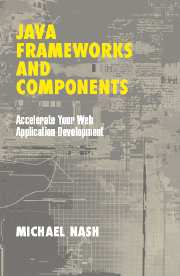Book contents
- Frontmatter
- Contents
- Acknowledgments
- 1 Components and Application Frameworks
- 2 Components: The Future of Web-Application Development
- 3 Application Frameworks: What Do They Provide and What Are the Benefits?
- 4 Choosing an Application Framework
- 5 A Catalog of Application Frameworks
- 6 Comparing Frameworks
- 7 Open Source and Components/Frameworks
- 8 Development Methodologies and Design Patterns
- 9 Integrated Development Environments
- 10 Strategies for Using Frameworks: Best Practices
- 11 Conclusions: The Future of Frameworks and Components
- Appendix: Case Studies
- Glossary
- Index
2 - Components: The Future of Web-Application Development
Published online by Cambridge University Press: 28 July 2009
- Frontmatter
- Contents
- Acknowledgments
- 1 Components and Application Frameworks
- 2 Components: The Future of Web-Application Development
- 3 Application Frameworks: What Do They Provide and What Are the Benefits?
- 4 Choosing an Application Framework
- 5 A Catalog of Application Frameworks
- 6 Comparing Frameworks
- 7 Open Source and Components/Frameworks
- 8 Development Methodologies and Design Patterns
- 9 Integrated Development Environments
- 10 Strategies for Using Frameworks: Best Practices
- 11 Conclusions: The Future of Frameworks and Components
- Appendix: Case Studies
- Glossary
- Index
Summary
WHY ARE COMPONENTS THE FUTURE OF WEB-APPLICATION DEVELOPMENT?
In this chapter we discuss the why of components and frameworks and the rationale behind their use. We also talk about the current state of Web-application development and where the industry perceives it is going to establish a firm foundation and justification for the use and development of components and frameworks.
We also look briefly at Java's suitability for component-based development and for the development of application frameworks, as well as for the specialized features of the extended Java platform and associated APIs that make them ideal to this task, including JavaBeans, Enterprise JavaBeans, and Reflection.
Where We are Today
The software industry is, for the most part, still creating much of its product in a “monolithic” fashion. The products may be more modular and configurable than they used to be, but most projects cannot be said to be truly component based. Even some projects being built with component-enabled technologies are not taking full advantage of the component model. It is quite possible to misuse component capabilities and as a result, to forfeit many of their benefits.
Many companies and organizations are becoming aware of the advantages and are getting their developers trained in the new technologies and the proper way to use them. It takes time for an organization to adopt such a significant change in their current practices.
- Type
- Chapter
- Information
- Java Frameworks and ComponentsAccelerate Your Web Application Development, pp. 35 - 53Publisher: Cambridge University PressPrint publication year: 2003



